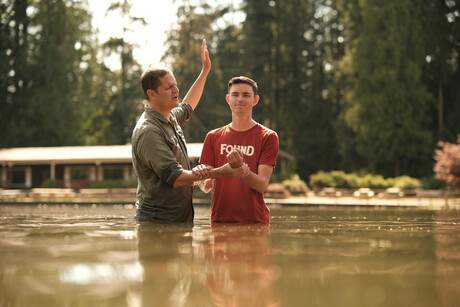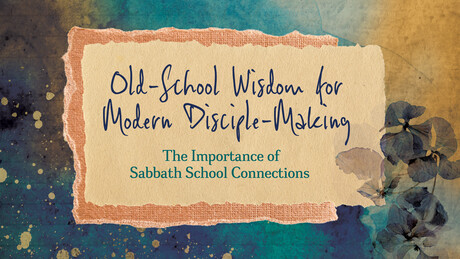Is the church to blame for the weak discipleship produced in our churches? Are parents to blame for the shaky faith of their sons and daughters? Is our culture to blame for the ungodly influences luring young adults into disbelief? These questions are being raised increasingly, not only in our local church context but also in other Christian denominations.
Over the decades, questions have emerged about why some young adults distance themselves from church involvement or experience crises of faith. Some ask whether the church fails to teach discipleship adequately, parents fail to pass on religious belief or if the broader society spreads unhelpful messages. However, rather than blame, many seeking answers truly want a compassionate community to accompany them through transitions in life, such as those in early adulthood, that often challenge religious understanding.
By listening non-judgmentally, churches can walk with people as they determine their relationship with faith. This article examines the crisis of faith experienced by many young adults and discusses approaches for churches to provide support. It considers whether the church, parents or broader cultural influences are to blame for weaker religious commitment. However, it argues that a more constructive approach is for faith communities to journey alongside individuals navigating periods of doubt.
Let's Get Started
Many young adults experience a "reordering of faith" during their mid-20s to mid-30s as life transitions like new jobs, relationships and responsibilities occur. 1
This period of emerging adulthood often involves questioning long-held religious beliefs and practices. Some individuals may feel disillusioned with church programs and involvement during this stage of spiritual discernment and redevelopment of personal convictions.
However, as Christians, we must be aware of these markers because instead of playing the blame game, young people want someone or a community willing to journey with them as they navigate this crisis of faith.
Every faith crisis is meant to reveal the truth about who you are. If you have never embraced true faith, all it will take is a minor crisis to cause you to wander away from the faith. You can keep what you never had.2
In times of crisis, young adults, especially, find themselves in the valley of doubt where questions about their faith arise. The complexities of this crisis in faith offer insights into its underlying causes and potential pathways toward reconciliation with God.
Drawing upon psychological, philosophical and theological perspectives, this examines the internal struggles and external influences contributing to a crisis of faith. As a church, the challenge lies in being present and journeying with them when they are in a crisis, offering support and guidance towards rediscovering and strengthening their faith while providing them hope as they navigate their way back to God.
As we journey through life, faith acts like a trusty compass or GPS, guiding us through sunny days and stormy nights. However, even though we have a so-called GPS, our beliefs and understanding of God sometimes hit rough patches of doubt. In those moments of uncertainty, finding our way back to God becomes a deep dive into our thoughts and values, sorting out what we truly believe in.
Practical Applications
As a pastor of two churches in Oregon Conference, I regularly evaluate our congregations' data trends. A recent Intergenerational Solutions assessment examined how well our church connects across ages in critical areas such as interaction, connection, interdependence, accommodation and empowerment. While scoring well in most areas, I was troubled by our lower rating of "empowerment."
This prompted reflection on how we actively involve youth and young adults. As over half our attendees are older generations, which may decrease in coming years, this alarming data brought the leadership team to consider how we can engage as a faith community with the new generations, like Generation Alpha and Generation Z, during questioning or crisis when connection is vital.
Research shows that people of different ages or walks of life experience loneliness and lack of meaningful relationships. If the church continues to have a cold shoulder with these groups, we risk further disconnect, especially if we do not mentor the young, pass leadership or journey with them in today's transient times.
Before any church makes a plan, leadership should ask these basic self-evaluation questions: Are we present as listeners? Are we supportive as guides? Crucial periods like emerging adulthood often involve reshaping beliefs, so churches would serve by comprehending such experiences non-judgmentally. Only thus can communities of faith continue nurturing future generations in their development. It's important to note that building relationships should be the foremost priority before any church programs.
On a positive note, a recent study highlights that 9 in 10 members highly appreciate their pastor's and church leadership’s embodiment of love, acceptance and forgiveness. Specifically, divorced individuals, new converts and those from low-income backgrounds respond even more positively to these qualities.
Furthermore, most of our congregation values inclusivity and acceptance of diverse lifestyles. Interestingly, our church's respondents with higher education levels and longer tenure tend to support greater acceptance of diverse lifestyles. This means we have hope as a church as it is still a powerful agency for the salvation of men and women as they learn and study the character of God as we continue to wait for His soon coming.
Despite these affirmations, we are called to challenge ourselves as a church community. I maintain optimism about our ability to support individuals grappling with crises of faith. However, we must remain intentional in our outreach efforts, particularly when our friends and loved ones need us most. Yes, doubting our faith is not just something the younger generations deal with; all generations are experiencing this, no matter where we come from.
Sometimes, life throws us curveballs that make us question everything we thought we knew. Other times, we ponder the big questions about God's existence. Moreover, with the world changing so fast around us, it is no wonder doubts about faith pop up in different ways.
In today's fast-paced and complex world, doubts about faith come in all shapes and sizes. Some of us start doubting what our religion has taught us, while others are on a quest to find what spirituality means to us personally. Trying to figure out how our faith fits into a world filled with stuff like money, different cultures and non-believers can feel like trying to solve a Rubik's Cube blindfolded.
However, here is the unique part: Doubts are not the end of the road; they are like pit stops on our journey. Instead of slamming the brakes on our spiritual growth, moments of doubt often kickstart a deeper connection with God. They challenge us to seek truth, encouraging us to be brave, humble and open to ideas that might be mind-bending.
In this exploration of faith's uncertainties, we are going to dive headfirst into the maze of questions, mapping out the steps to getting back in sync with God by pondering deeply and fueling a warm church community. We will empathize with people — especially young adults — and be intentional about listening to their stories and assuring that we will walk alongside them when they are feeling worn out and confused, as they try to navigate their lives amidst the crisis in faith.
What makes belonging essential for us is that we are a social species. We cannot survive without one another. Brené Brown wrote, "True belonging is the spiritual practice of believing in and belonging to yourself so deeply that you can share your most authentic self with the world and find sacredness in being a part of something and standing alone in the wilderness. True belonging does not require you to change who you are but to be who you are."3
There will be times that you will witness the struggles and joys as a young adult's faith is developed. Kara E. Powell and Chap Clark wrote, "The greatest gift you can give to your children is to let them see you struggle and wrestle with how to live a lifetime of trust in God."4
Let us be like surfers in that we can jump our boards and be there for our young adults during the spiritual and emotional waves they are facing; we need to ride those waves with them. Yes, there will be times when they will love to read the Bible and go to church and suddenly become uninterested.
Whatever waves are happening in their lives, let us be there for them, walking alongside and helping them find that God is still there in the midst of the waves.
Actionable Steps
To better support young adults navigating crises of faith, church leaders should facilitate intergenerational relationship-building events and programs.
- Start mentoring programs.
- Conduct focus groups to understand the needs of youth.
- Provide spiritual companions to those with questions.
- Plan inclusive social activities and educate on faith development.
- Involve youth in leadership opportunities.
- Communicate an open and welcoming community.
- Network with campus ministries.
- Schedule intergenerational discussion groups addressing common doubt-causing life issues.
- Regularly assess programs to ensure ongoing relevance and success in engaging younger generations.
All of these work toward the goal of journeying compassionately with individuals as they shape their own beliefs and fostering a church environment where spiritual exploration is normalized rather than judged.
Conclusion
I pray that this article will awaken us and allow us to explore the challenges churches face in nurturing vital discipleship, particularly among young adults experiencing crises of faith.
Let us remember that young adults often experience faith crises during transitional periods influenced by work, relationships and life changes. A church must engage effectively with younger generations, addressing their doubts and providing support.
Statistics reveal high levels of loneliness and disconnection among young people, highlighting a need for meaningful community and spiritual guidance. Positive findings include strong appreciation within a congregation for qualities like love, acceptance and forgiveness demonstrated by church leaders.
Despite these strengths, a call for continued efforts to support individuals navigating doubts and crises of faith is needed, emphasizing the church's role in providing hope and guidance for generations not attending our church regularly.
In Matt. 28:19, Jesus instructs, "Go and make followers of all people in the world." This command challenges us to actively engage with those experiencing crises of faith, especially young adults.
As a church community, let us commit to walking alongside them, listening to their stories and offering support and guidance as they navigate through doubt and uncertainty. I firmly believe that if the church community mentors and supports young individuals, we will witness a mighty revival and an intergenerational church working together toward our mission.
In the early years of our church, many Adventist pioneers began their impactful work in their teenage years. The church believed and heard their voices. Pioneers such as Ellen G. White, John Loughborough, J. N. Andrews, Uriah Smith and John Harvey Kellogg began shaping the Adventist Church when they were young adults or teenagers.
The Adventist pioneers were marked by their youth, passion and devotion to God. Despite their age, these pioneers made significant contributions. Survey data still indicates that high school and college students are 2.7 times more likely to believe their religious convictions are stronger when they belong to a community of believers who encourage one another.5
As Ellen G. White once expressed, "With such an army of workers as our youth, rightly trained, might furnish, how soon the message of a crucified, risen and soon-coming Saviour might be carried to the whole world!"6
While some may question where the blame lies for weaker religious commitment among youth, a more constructive approach is for faith communities to understand these challenges as opportunities for outreach and support.
As Jesus calls us to make disciples of all people, we must go wherever our friends and families are in their spiritual journey. By demonstrating love, acceptance and a steadfast presence, we can help them rediscover and strengthen their faith, ultimately bringing them closer to God's purpose for their lives.
Sources
- V. Bailey Gillespie, The Experience of Faith (Religious Education Press, 1998).
- Lina Abujamra, Faith Fractured (Moody Publishers, 2021), 115.
- Brené Brown, Braving the Wilderness (Random House Publishing Group, 2021).
- Kara E. Powell and Chap Clark, Sticky Faith: Everyday Ideas to Build Lasting Faith in Your Kids (Zondervan, 2011), 46.
- Jenny J. Lee, “Religious and College Attendance: Change among Students,” The Review of Higher Education 25, (2002): 369–84, https://doi.org/10.1353/rhe.2002.0020.
- Ellen G. White, Education (Pacific Press Publishing Association, 1903).
References
Cory Seibel, Engage All Generations (Abilene Christian University Press, 2021).
Holly Catterton Allen, Christine Lawton, Cory L. Seibel and Jason Brian Santos, Intergenerational Christian Formation (IVP Academic, 2023).
Josh Packard, Ellen B. Koneck, Jerry Ruff, Brian Singer-Towns and John M. Vitek, Belonging: Reconnecting America's loneliest generation (Springtide Research Institute, 2020).
Steven Argue and Caleb Roose, Sticky Faith Innovation (Fuller Youth Institute, 2021).
Valerie M. Grissom, All Ages Becoming (Abilene Christian University Press, 2023).









